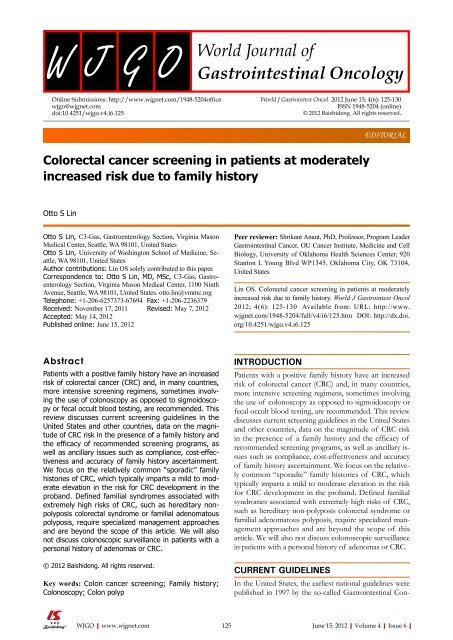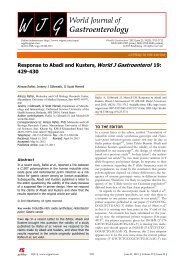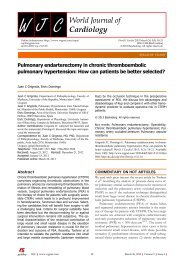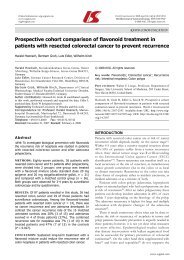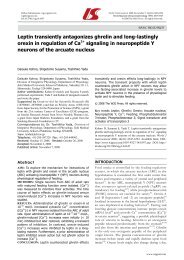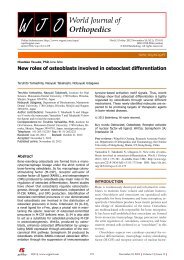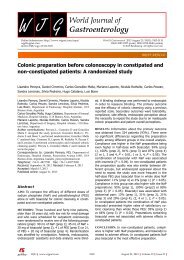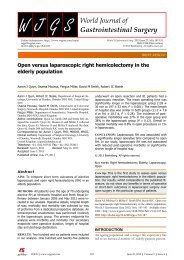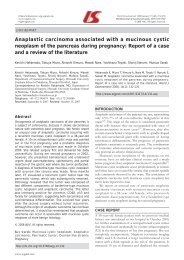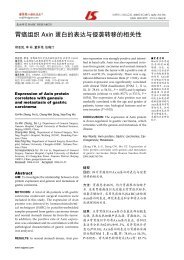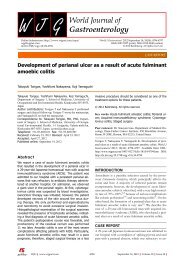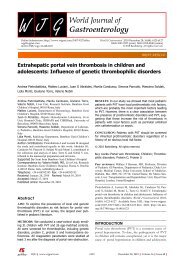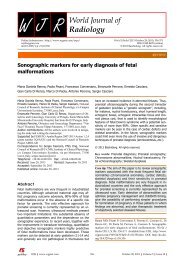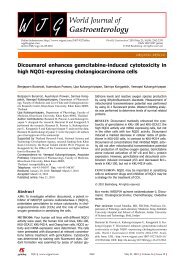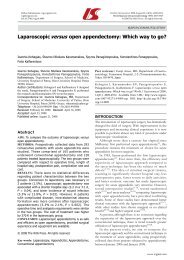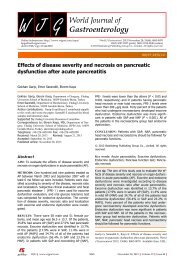6 - World Journal of Gastroenterology
6 - World Journal of Gastroenterology
6 - World Journal of Gastroenterology
You also want an ePaper? Increase the reach of your titles
YUMPU automatically turns print PDFs into web optimized ePapers that Google loves.
Online Submissions: http://www.wjgnet.com/1948-5204<strong>of</strong>fice<br />
wjgo@wjgnet.com<br />
doi:10.4251/wjgo.v4.i6.125<br />
Colorectal cancer screening in patients at moderately<br />
increased risk due to family history<br />
Otto S Lin<br />
Otto S Lin, C3-Gas, <strong>Gastroenterology</strong> Section, Virginia Mason<br />
Medical Center, Seattle, WA 98101, United States<br />
Otto S Lin, University <strong>of</strong> Washington School <strong>of</strong> Medicine, Seattle,<br />
WA 98101, United States<br />
Author contributions: Lin OS solely contributed to this paper.<br />
Correspondence to: Otto S Lin, MD, MSc, C3-Gas, <strong>Gastroenterology</strong><br />
Section, Virginia Mason Medical Center, 1100 Ninth<br />
Avenue, Seattle, WA 98101, United States. otto.lin@vmmc.org<br />
Telephone: +1-206-6257373-67694 Fax: +1-206-2236379<br />
Received: November 17, 2011 Revised: May 7, 2012<br />
Accepted: May 14, 2012<br />
Published online: June 15, 2012<br />
Abstract<br />
Patients with a positive family history have an increased<br />
risk <strong>of</strong> colorectal cancer (CRC) and, in many countries,<br />
more intensive screening regimens, sometimes involving<br />
the use <strong>of</strong> colonoscopy as opposed to sigmoidoscopy<br />
or fecal occult blood testing, are recommended. This<br />
review discusses current screening guidelines in the<br />
United States and other countries, data on the magnitude<br />
<strong>of</strong> CRC risk in the presence <strong>of</strong> a family history and<br />
the efficacy <strong>of</strong> recommended screening programs, as<br />
well as ancillary issues such as compliance, cost-effectiveness<br />
and accuracy <strong>of</strong> family history ascertainment.<br />
We focus on the relatively common “sporadic” family<br />
histories <strong>of</strong> CRC, which typically imparts a mild to moderate<br />
elevation in the risk for CRC development in the<br />
proband. Defined familial syndromes associated with<br />
extremely high risks <strong>of</strong> CRC, such as hereditary nonpolyposis<br />
colorectal syndrome or familial adenomatous<br />
polyposis, require specialized management approaches<br />
and are beyond the scope <strong>of</strong> this article. We will also<br />
not discuss colonoscopic surveillance in patients with a<br />
personal history <strong>of</strong> adenomas or CRC.<br />
© 2012 Baishideng. All rights reserved.<br />
Key words: Colon cancer screening; Family history;<br />
Colonoscopy; Colon polyp<br />
<strong>World</strong> J Gastrointest Oncol 2012 June 15; 4(6): 125-130<br />
ISSN 1948-5204 (online)<br />
© 2012 Baishideng. All rights reserved.<br />
Peer reviewer: Shrikant Anant, PhD, Pr<strong>of</strong>essor, Program Leader<br />
Gastrointestinal Cancer, OU Cancer Institute, Medicine and Cell<br />
Biology, University <strong>of</strong> Oklahoma Health Sciences Center, 920<br />
Stanton L Young Blvd WP1345, Oklahoma City, OK 73104,<br />
United States<br />
Lin OS. Colorectal cancer screening in patients at moderately<br />
increased risk due to family history. <strong>World</strong> J Gastrointest Oncol<br />
2012; 4(6): 125-130 Available from: URL: http://www.<br />
wjgnet.com/1948-5204/full/v4/i6/125.htm DOI: http://dx.doi.<br />
org/10.4251/wjgo.v4.i6.125<br />
INTRODUCTION<br />
Patients with a positive family history have an increased<br />
risk <strong>of</strong> colorectal cancer (CRC) and, in many countries,<br />
more intensive screening regimens, sometimes involving<br />
the use <strong>of</strong> colonoscopy as opposed to sigmoidoscopy or<br />
fecal occult blood testing, are recommended. This review<br />
discusses current screening guidelines in the United States<br />
and other countries, data on the magnitude <strong>of</strong> CRC risk<br />
in the presence <strong>of</strong> a family history and the efficacy <strong>of</strong><br />
recommended screening programs, as well as ancillary issues<br />
such as compliance, cost-effectiveness and accuracy<br />
<strong>of</strong> family history ascertainment. We focus on the relatively<br />
common “sporadic” family histories <strong>of</strong> CRC, which<br />
typically imparts a mild to moderate elevation in the risk<br />
for CRC development in the proband. Defined familial<br />
syndromes associated with extremely high risks <strong>of</strong> CRC,<br />
such as hereditary non-polyposis colorectal syndrome or<br />
familial adenomatous polyposis, require specialized management<br />
approaches and are beyond the scope <strong>of</strong> this<br />
article. We will also not discuss colonoscopic surveillance<br />
in patients with a personal history <strong>of</strong> adenomas or CRC.<br />
CURRENT GUIDELINES<br />
EDITORIAL<br />
In the United States, the earliest national guidelines were<br />
published in 1997 by the so-called Gastrointestinal Con-<br />
WJGO|www.wjgnet.com 125<br />
June 15, 2012|Volume 4|Issue 6|


